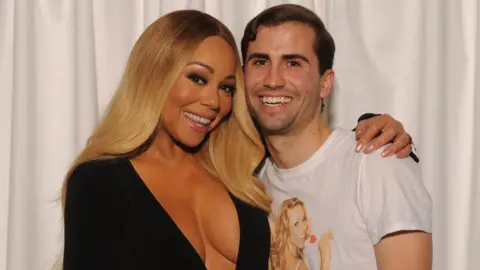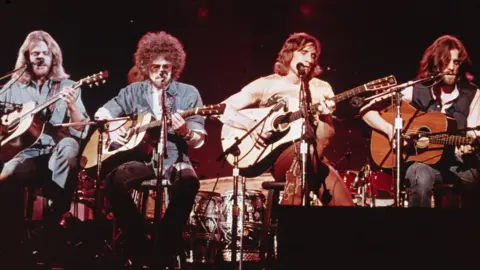'I spent £40 on an album I already own'
 Jeffrey Ingold
Jeffrey Ingold"New Mariah Carey music - that's always a reason to get me out spending money!" says Jeffrey Ingold, who reckons he has spent about £8,000 on the singer's music over his lifetime - including going to international concerts.
While he may already own her classic Merry Christmas album from 1994, that certainly hasn't stopped him buying the latest version, reissued a few weeks ago for the 25th anniversary.
"It includes recordings which I've never heard before," he says. "So to have the chance to be transported back and hear vintage Mariah is worth every penny."
As well as downloading the album on Spotify, Jeffrey pre-ordered the CD and vinyl versions, spending a total of £40. "If you're a true fan - or in Mariah's world, lamb - it's always worth it."
It's this kind of devotion that record companies rely on, as more and more bands decide to relaunch their biggest hits.
This year has also seen the release of "deluxe" and anniversary editions of classic albums by REM, Prince, Suede, the Rolling Stones, Madonna, Jethro Tull - and of course, the Beatles.
After similar success with reissues of Sgt Pepper's Lonely Hearts Club Band and The White album, the 50th anniversary edition of Abbey Road went to number one in October,
In the process, it set a new UK chart record as the album with the longest gap between official chart-topping stints, at 49 years and 252 days.
Milestones in rock
Gennaro Castaldo from the British Phonographic Industry, which represents the UK music business, says the trend could just be down to timing.
"Lots of 'classic' albums that came out in the 60s and 70s, and even the 80s and 90s, are now beginning to hit significant anniversaries," he told the BBC.
"There is a significant group of music enthusiasts that are passionate about owning and collecting vinyl and CDs - and particularly limited edition and deluxe collections."
At a time when streaming has become by far the most popular way of listening to music, the re-release of albums is focused on boosting physical sales.
Exclusive artwork, hardback books, DVDs and coloured vinyl are all designed to appeal to those fans who still like to own a copy of their favourite music.
 Getty Images
Getty ImagesAbbey Road was a case in point. According to the Official Chart Company, in the week of its release, it sold 34,500 copies, 90% of those being physical sales. It was the best-selling vinyl release of the week too, with 9,000 sales on vinyl alone.
"The vinyl revival has definitely made a difference," says Paul Sinclair, who runs superdeluxeedition.com, a website specialising in reissues.
He explains that while some cost little more than any other new record, deluxe and now super-deluxe special editions can cost hundreds of pounds.
Pink Floyd's The Later Years - an 18-disc box set just released - was available to pre-order on the band's website for £399.
But Mr Sinclair says "no-one batted an eyelid" when a similar price tag was attached to their Early Years box set back in 2016, with plenty of music lovers willing to pay for the added extras, "especially when it comes to a band like Pink Floyd."
Limited appeal
So how much of it is about music and how much about money? David Ambrose, who worked at EMI and MCA and now tutors at City University, says reissues are an "easy win" for record companies.
He says that while an artist can expect royalties of between 14% and 16% for an original release, it drops to about 4% on a reissue. Plus labels don't have to stump up the costs of a tour, a video or any promotion. So the margins are much higher.
"Sales are limited, however - it probably isn't going to appeal beyond a pure, established fanbase," says Mr Ambrose.
But for those still making music, superdeluxeedition.com's Mr Sinclair points out it can also be a clever marketing trick: "These reissues tend to be surrounded by a wave of love and it never hurts to remind people you were once brilliant when you've got new music to promote."
 Getty Images
Getty ImagesBut some argue that this retreat to nostalgia points to a wider issue in the music industry - the fact that there is, for many people, too much choice.
"When we are faced with such abundance, we need help to make decisions. It is for this reason, along with others, that reissues and the growth of heritage acts have emerged as such a central business model," says Dr George Musgrave, a researcher at the University of Westminster.
Dr Musgrave says that rather than helping smaller bands break through, the sheer amount of music on offer actually ends up benefiting established artists. "According to Forbes 2019, the band making the most money isn't a new act - it is the Eagles!" he adds.
More of the same
So how did Mariah Carey's re-release of Merry Christmas perform this time around? Not spectacularly: it peaked at 95 in the UK album chart.
Victoria Kenny, another fan who bought the album, says this one was worth adding to her collection - but she's wary of being taken for a ride.
"Some classic 80s albums seem to get reissued over and over again and it feels like they're just milking fans with the same content in a different coloured box." she says.
However, Jeffrey Ingold thinks there is always more to be heard from his favourite artist - even if it's more of the same.
"There will come a time when Mariah is no longer releasing music, or not as frequently," he says.
"So for however long she continues to put out material - new or old - I'll be there."
